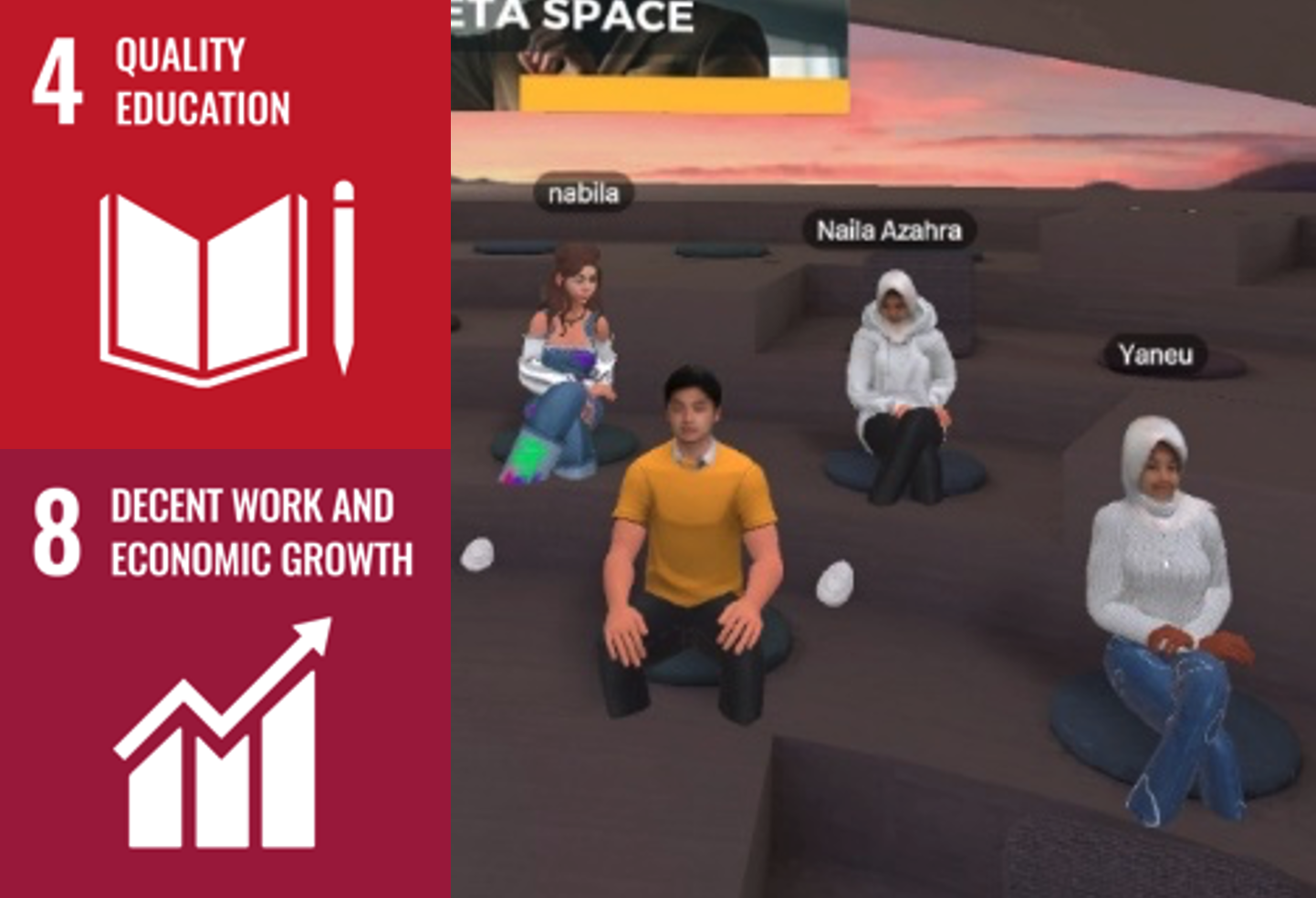Main Article Content
Abstract
Vocational High Schools (SMK) are a part of formal education that aims to produce productive, work-ready graduates in accordance with 21st-century needs. However, the existing conditions are not in line with industry demands that require graduate competencies aligned with technological advancements. This community service program aims to enhance SMK students' skills in creating 3D animations, a technology that plays an important role in metaverse content creation. The program implementation method is an action research method consisting of introduction, training, and mentoring stages. Based on the evaluation results, the pre-test scores ranged from 24–54, and the post-test scores ranged from 46–94. This shows a 57.45% increase in skill abilities, with an average N-gain score of 0.66 (medium criteria), meaning that 3D visual training for facing industry in the metaverse era for SMK students is effectively used to improve abilities.
Keywords
Article Details

This work is licensed under a Creative Commons Attribution-NonCommercial 4.0 International License.
References
- Arif, M., & Pratama, Y. B. (2023). Student training program of building drawing and augmented reality in SMKN 2 Pangkalpinang. Community Empowerment, 8(5), 615–620. https://doi.org/10.31603/ce.8375
- Bao, L. (2006). Theoretical comparisons of average normalized gain calculations. American Journal of Physics, 74(10), 917–922. https://doi.org/10.1119/1.2213632
- Buhalis, D., Leung, D., & Lin, M. (2023). Metaverse as a disruptive technology revolutionising tourism management and marketing. Tourism Management, 97(3), 104724. https://doi.org/10.1016/j.tourman.2023.104724
- Chair, S. Y., Sit, T. Y., Ng, W. C., Mak, Y. Y., & Li, K. H. (2023). The effects of a social service project on personal growth and academic performance in secondary school students from low socioeconomic status. International Journal of Inclusive Education, 27(14), 1516–1529. https://doi.org/10.1080/13603116.2021.1902001
- Evans, J., McDougall, J., & Baldwin, P. (2006). An Evaluation of the “Youth En Route” Program. Physical & Occupational Therapy In Pediatrics, 26(4), 63–87. https://doi.org/10.1300/J006v26n04_05
- Ferm, L., Persson Thunqvist, D., Svensson, L., & Gustavsson, M. (2018). Students’ strategies for learning identities as industrial workers in a Swedish upper secondary school VET programme. Journal of Vocational Education & Training, 70(1), 66–84. https://doi.org/10.1080/13636820.2017.1394357
- Holonext. (2022). Metaverse 101: Understanding the Seven Layers of the Metaverse. In HoloNext, https://holonext.com/metaverse-101-understanding-the-seven-layers/ [Access Date: Mar 20,2022].
- Hunt, C. W., & Ellison, K. J. (2010). Enhancing Faculty Resources Through Peer Mentoring. Nurse Educator, 35(5), 192–196. https://doi.org/10.1097/NNE.0b013e3181ed8143
- Jain, K., Chirag, Mittal, H. K., Vasesi, S., Antil, B., & Pandey, H. C. (2023). Exploring the Convergence of Augmented and Virtual Reality: Applications, Challenges and Future Prospects. 2023 International Conference on Advanced Computing & Communication Technologies (ICACCTech), 626–634. https://doi.org/10.1109/ICACCTech61146.2023.00107
- Jonck, P., De Coning, R., & Radikonyana, P. S. (2018). A micro-level outcomes evaluation of a skills capacity intervention within the South African public service: Towards an impact evaluation. SA Journal of Human Resource Management, 16. https://doi.org/10.4102/sajhrm.v16i0.1000
- Kim, Y.-A., Kim, K.-A., & Tzokas, N. (2022). Entrepreneurial universities and the effect of the types of vocational education and internships on graduates’ employability. Studies in Higher Education, 47(5), 1000–1009. https://doi.org/10.1080/03075079.2022.2055324
- Pracihara, B. (2017). 196095-Instruksi-Presiden-No-9-Tahun-2016-Revit-Cafdfafc. Seminar Nasional Seni Dan Desain: Membangun Tradisi Inovasi Melalui Riset Berbasis Praktik Senin Dan Desain", 313–319.
- Prasetya, F., Fajri, B. R., & Ranuharja, F. (2020). Development design augmented reality-based jobsheet in CNC programming subjects. International Journal of Innovation, Creativity and Change, 10(11), 50–67.
- Pritchard, F. F., & Whitehead, I. (2004). Serve and Learn: Implementing and Evaluating Service-Learning in Middle and High Schools. Routledge. https://doi.org/10.4324/9781410610478
- Richard, M. (2018). Ini Penyebab Lulusan SMK di Indonesia Sulit dapat Kerja. In Bisnis.com (p. 1).
- Rindiantika, Y. (2016). Pengembangan SMK Melalui Dunia USaha dan Industri (DUDI): Kajian Teoretik. Jurnal Intelegensia, 147(March), 11–40.
- Rohmah, M. F., Cahyono, R. E., & Zahara, S. (2021). Pelatihan dan Pengenalan Dasar Instrumentasi Industri untuk Menyiapkan Lulusan Siap Kerja Pada Masa Pandemi Covid-19 di SMK Palapa Mojokerto. ABDIMAS NUSANTARA: Jurnal Pengabdian Kepada Masyarakat, 2(2), 343–349.
- Sakdapat, N. (2024). Approaches for sustainable professional skill development for vocational education students in Thailand. F1000Research, 13, 401. https://doi.org/10.12688/f1000research.146802.1
- Sari, I. P., Permana, F. C., Firmansyah, F. H., & Hernawan, A. H. (2021). Computer-based learning: 3D visualization and animation as content development for digital learning materials for traditional Indonesian cloth (Songket Palembang). In Journal of Physics: Conference Series (Vol. 1987, Issue 1). https://doi.org/10.1088/1742-6596/1987/1/012003
- Shi, F., Ning, H., Zhang, X., Li, R., Tian, Q., Zhang, S., Zheng, Y., Guo, Y., & Daneshmand, M. (2023). A new technology perspective of the Metaverse: Its essence, framework and challenges. Digital Communications and Networks. https://doi.org/10.1016/j.dcan.2023.02.017
- Vance, J. E. (2002). Mentoring to Facilitate Resiliency in High-Risk Youth. In Community Treatment for Youth (pp. 139–153). Oxford University PressNew York. https://doi.org/10.1093/acprof:oso/9780195134575.003.0007
- Wahab, A., Junaedi, J., & Azhar, M. (2021). Efektivitas Pembelajaran Statistika Pendidikan Menggunakan Uji Peningkatan N-Gain di PGMI. Jurnal Basicedu, 5(2), 1039–1045. https://doi.org/10.31004/basicedu.v5i2.845
- Zhang, X., & Wang, A. (2024). Enhancing the Performance of Vocational Education in the Digital Economy with the Application of Fuzzy Logic Algorithm. International Journal of Computational Intelligence Systems, 17(1), 185. https://doi.org/10.1007/s44196-024-00591-9

